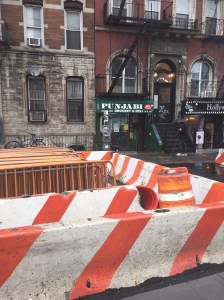
“I never take Houston, you can’t take Houston anymore,” a veteran cab driver told this reporter as he weaved through smaller streets to make it across town. Houston Street, Manhattan’s great divide, is plagued with construction, causing major traffic and frustration for both city drivers and locals.
The E. Houston Street Reconstruction Project, headed by the Department Of Transportation and NYC Department of Design and Construction and part of the larger Lower Manhattan Construction project, is slowly but surely making its way through its numerous goals, including “reconstructing/replacing combined sewers, truck mains, water mains, catch basins, fire hydrants, sidewalks, trees, as well as two ‘Green Street’ park areas,” according to their news letter.
While the project is meant to improve lives in the area, it has been clobbering local businesses. Last summer El Paso Restaurant on Houston closed. The owner first complained of the effects of construction on his business in 2012. An employee who declined to be named at the East Houston Wine & Liquor called the construction an “inconvenience” and noted that on the days construction most actively blocked the roadways, its business declined noticeably.
Punjabi Grocery and Deli has been particularly outspoken about the effects of the road construction on its sales. The owner, Satnam Singh, told Commercial Observer he has been in business for almost 24 years. For much of its lifetime, the deli has been a staple for taxi drivers, who used to pull up and run in for a quick bite. However, the “Green Street” park area on Houston created by the city is designed to prevent this; the green space will create a wide barrier between the business and the road.
“The construction has been killing my business for the last five and a half years because there is no standing and no parking. Taxis don’t even want to drive on the street, how would they come to eat here?” Mr. Singh said.
Before the multimillion-dollar construction project began, Mr. Singh served between 50 and 70 taxi drivers per day. Today, he serves about five drivers and a handful of locals who walk in. The deli raised prices in the fall to make ends meet and avoid closing.
The shop also offers a rest station for cab drivers. Seeking a solution that would bring back his taxi business, the owner petitioned the city to create a “taxi relief stand” on Avenue A and Houston. The petition, which has over 3,000 signatures, has not led to a taxi stand for the business, though the Taxi and Limousine Commission did say it was investigating after an inquiry from CO.
Bobby Singh, a taxi driver of no relation to the owner, parked three blocks from Punjabi, which he said has some of the best food in town. “It’s more money in the meter because of the construction, but we have to eat. What else can we do?” Bobby Singh has been a patron of Punjabi for six years.
Though DOT has established community construction liaisons to assist with the concerns of locals, some businesses affected have had little to no interaction with liaisons and planners. While the city may not be directly intervening, an expert noted that often workers will shop at affected businesses to ease the fiscal pain of the construction. “The construction employees can and do frequent the local businesses, they try to offer support,” said Alen Gershkovich, president of Inspiron Construction.
Overall, Mr. Gershkovich believes both locals and the city will benefit from the project. “It is something really for the benefit of a longer-term plan,” he said. “While it is not always convenient, there is no way around keeping the site safe and having the street closed.”



